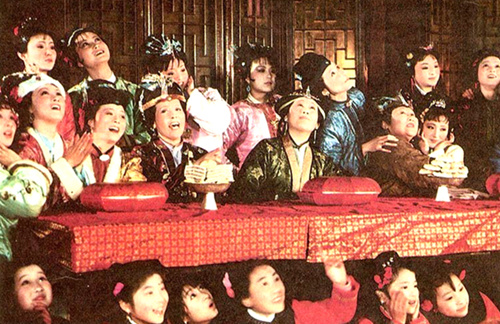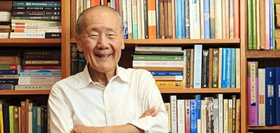The Lantern Festival in Dream of the Red Chamber
Author : REN GUANHONG Source : Chinese Social Sciences Today 2019-02-18

A still from the 1987 television series adapted from the Dream of the Red Chamber. The Jia family enjoys an evening banquet and fireworks show on the night of the Lantern Festival. Photo: FILE
The Lantern Festival, also called Yuan Xiao Festival, is celebrated in China and other Asian countries to honor deceased ancestors on the 15th day of the first lunar month (also known as the yuan month). The day marks the first full moon of the new lunar year and the end of the Chinese New Year.
Dream of the Red Chamber is considered the peak of the art of the novel in ancient China. The author, Cao Xueqin (c. 1715–1763), wrote this masterpiece after he had suffered the decline of his family fortunes from its heydays of power and affluence during the Qing Dynasty (1616–1912). This novel charts the course of prosperity and decline of an aristocratic family, the Jia family. It is also a tragedy of love and marriage that signals a burgeoning trend toward the pursuit of personal freedom and opposition to the feudal system, as the feudal period was entering its closing phase in China.
Dream of the Red Chamber is not only known by the distinct personalities of its characters and richly complex relationships within the Jia family, but also known as an encyclopedic novel providing a wealth of details concerning every grade and situation of Chinese society of that time—clothing and ornaments, customs and etiquette, food and drink, etc. It makes reference to three Lantern Festivals of different years. Cao Xueqin incorporates the festive customs of the south and the north, the Manchu and the Han into the novel, depicting how the aristocracy and the commoners celebrated the Lantern Festival in imperial China.
Festive parade and lanterns
In the opening chapter of the novel, Yinglian, the only daughter of a gentleman named Zhen Shiyin, is taken out by a servant to appreciate ornamental lanterns on the night of the Lantern Festival. The three-year-old girl is kidnapped and her absence breaks her parents’ hearts and destroys the whole family. Arranging such a tragedy in a cheerful festival reveals the essential note of the novel that the feudal society is essentially tragic.
Though there are not many details about the festival in the chapter, two important customs—shehuo and lanterns—are mentioned. Shehuo is a traditional custom of the Han Chinese in northern China. People in various costumes celebrate the Lantern Festival with a big parade at night, performing with musical instruments and dancing, including the lion dance, dragon dance, stilt dance, land boat dance (a dancer wears a boat-like structure made of cloth so that he appears to sit in a boat, accompanied by a boatman holding an oar), trotting donkey dance (in this dance women wear a donkey prop around their waist and pretend they are carrying a child in their arms; A man follows behind the “donkey” with a whip), yang ge (a traditional northern Chinese folk dance accompanied by singing, drums and gongs and featuring colorful fans) and big-headed doll dance. Appreciating lanterns is the primary activity of the celebrations. During the festival, houses are festooned with colorful lanterns, often with riddles written on them.
Yuanchun’s visit to her parents
The next two festive celebrations in the novel happen within the Rong Mansion of the Jia family, illustrating the aristocratic way of celebrating the Lantern Festival.
In the 18th chapter, Jia Yuanchun, a direct descendant of the Jia family, is permitted to visit her parents on the day of the Lantern Festival after becoming an Imperial Consort. Her illustrious position as a favorite of the Emperor marks the height of the Jia family’s power. Therefore, the novel depicts a stunning visual exhibition of the extravagant decoration of the Rong Mansion through Jia Yuanchun’s perspective. “She observed that the courtyard was brightly lit with ornamental lanterns of every kind, all exquisitely made of finest gauze.” “She found it (the garden) wreathed with the perfumed smoke of incense, splendid with flowers, brilliant with countless lanterns, melodious with strains of soft music. Words fail to describe that scene of peaceful magnificence and noble refinement.” “She saw before her a clear waterway winding like a dragon. From the marble balustrades on either bank lanterns of crystal and glass of every description shed a silvery light, clear as snow. The wintry boughs of the willows and apricot trees above them were festooned with artificial flowers and leaves made of rice paper and silk, and from every tree hung lanterns. Lovely too on the water were the lotus flowers, duckweed and water-fowl made out of shells and feathers. Lanterns high and low seemed trying to outshine each other. It was truly a world of crystal and precious stones! The boats were magnificent too, with lanterns, rare miniature gardens, pearl portieres, embroidered curtains, rudders of cassia and oars of aromatic wood.” (Translated by Yang Xianyi and Gladys Yang)
Some festive customs can be found from this section. The novel mentions that on the day of the festival, Yuanchun has to pray in the Palace of the Precious Spirit before asking leave from the Emperor. The aforementioned palace is a Taoist temple. Since the 15th day of the first lunar month is also the birthday of the Taoist God of Fortune, Tianguan, followers often pray for good fortune in Taoist temples on that day. Gradually, it became a traditional ritual of the Lantern Festival. In the North China Plain today, it is still common for a married daughter to visit her parents during the Lantern Festival.
Solving riddles written on lanterns is another popular activity during the Lantern Festival, which dates back to the Song Dynasty. In the novel, after returning to the imperial palace, Yuanchun asks a eunuch to send over a lantern riddle to the Rong Mansion for the youth to solve. The author intentionally gives a hint of each main character’s destiny through their riddles. Those riddles—ambiguous and yet suggestive—contain the predictions of the characters’ future tragedies. For instance, what Yuanchun describes in her riddle is the firecracker, which disintegrates and turns to ash after a single explosion, implying that Yuanchun only enjoys a short moment of glory and then dies young. Her death is a sign of the end to the family’s privileged position at court. The riddle recited by Jia Xichun (Yuanchun’s younger cousin) is about a temple lamp, which also contains an unfavorable allusion. At the end of the novel, Xichun gives up her worldly concerns and becomes a Buddhist nun after the fall of the Jia family.
Evening banquet in the Rong Mansion
The 53rd and the 54th chapters portray the evening banquet held by the Jia family during the Lantern Festival. The Rong Mansion, though resplendent with new decorations, is less luxurious than the setting of the former festive celebration. It signifies that the Jia family is beginning to decline. The Lady Dowager has sent to invite all the family members to the banquet, but only a few relatives appear, conveying a sense of awkwardness, which is covered up by the merry atmosphere. This also serves as an omen of misfortune.
The chapters about the evening banquet are full of details of the Lantern Festival. Eating yuanxiao (glutinous rice balls typically filled with sweet red bean paste, sesame paste or peanut butter) and playing with fireworks are important activities to celebrate the Lantern Festival. The other activities, such as the Drum and Blossom Game, appreciating drama and storytelling, though not special for the Lantern Festival, were part of the regular celebrations within noble families in ancient China. The Drum and Blossom Game was originally one of the drinking games (jiuling) enjoyed in ancient China, which usually required players to produce original, novel and fine literary pieces with quotations from history, poems and other forms of literature. It is also known as Drum and Flowers, which requires a flower to be passed around players who sit in a circle when someone begins to play a drum. Whoever has the flower when the drum stops has to drink and say something.
The Jia family purchases an opera troupe for the feast welcoming Yuanchun back home. Most of the actresses are just teenage girls. They live in the Rong Mansion and enjoy the same status as servants. Traditional opera was extremely popular during the Qing Dynasty. Watching opera was one of the main forms of entertainment among the upper classes. When there were celebrations or good things happening, rich families would invite troupes to their house for performances. Some even kept a troupe in their house and competed with the other socialites by owning opera troupes that provided the most extravagant entertainment. Sometimes audiences pleased by the opera would throw money on the stage to reward the actors and actresses.
(edited by REN GUANHONG)
Interview with Wang Gungwu on significance of studying overseas Chinese
Wang Gungwu is a distinguished Australian historian who studies overseas Chinese. He currently works at the Faculty o...
-
On the rat/mouse of the zodiac
2020-02-20
-
Regional development calls for Huaihe culture’s soft power
2020-01-10
-
Archaeological discoveries unveil Maritime Silk Road
2020-01-06
-
China’s industrial art printing
2019-12-10
-
Yue-Gan Ancient Road: A journey into Hakka history
2019-05-13
-
The Lantern Festival in Dream of the Red Chamber
2019-02-18














 2011-2013 by www.cssn.cn. All Rights Reserved
2011-2013 by www.cssn.cn. All Rights Reserved